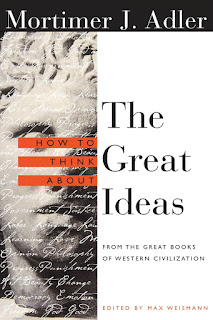How To Think About Opinion
This section is presented as a conversation between Adler and Lloyd Luckman. I’m not certain who Mr. Luckman is but he appears to be Adler’s co-host and interviewer for the TV show. Luckman is confused as to why Adler would consider “opinion” a great idea. Adler explains.
He addresses both the theoretical significance and the practical significance of opinion.
The greatest problem in determining certainty and probability is the distinction between knowledge and opinion, therefore to judge the worth of opinions, people created the theory of probability. For a sceptic, we know nothing for certain and everything is a matter of opinion. One opinion is just as good as another and everything is subjective and relative.
Opinion is also connected with the great theoretical problem of agreement and disagreement. We essentially agree and disagree on every fundamental question.
“Controversy” has almost become a bad word but discussion and public debate are crucial to the health of a society. We have a moral duty to be hospitable to controversy.
Majority rule is essential in a democracy, but we also need to respect what is sound in the judgement of the minority.
 |
| A Difference of Opinion (1896) Sir Lawrence Alma-Tadema source Wikiart |
Characteristics of Opinion as Contrasted with Knowledge
It is important to see the difference of both in terms of truth, but there is a definition of truth that must be agreed upon, and he proposes the following: “A statement is true if it says that that which is is, or if it says that which is not is not; and a statement is false if it says that that which is not is, or that which is is not.”
Opinion versus Knowledge
Knowledge is having the truth and knowing that you have it. Opinion consists in not being sure that you have the truth or not being sure what you say is true or false. For example, in a courtroom there is an opinion rule where the witness must state what he saw happen, not what he thinks happened. Opinions can be right or wrong, true or false. Knowledge cannot be false.
Another criteria for judging on knowledge or opinion is whether something is universally known or agreed upon. If everyone MUST agree, it isn’t opinion, it’s knowledge.
Additional criteria:
- Doubt and belief are relative only to opinion, never to knowledge. For example, “two plus two equals four” is known. As to whether there will be another world war or not, one can only offer an opinion.
A Right To Our Own Opinion
- There is no conflict with knowledge but there can be conflicting opinions. Reasonable men can agree to disagree.
- We can talk about a consensus of opinion, but we never refer to a consensus of knowledge. Aristotle’s rule for consensus of opinion is: “In arguments dealing with matters of opinion, we should base our reasoning on the opinions held by all. Or if not by all, at least those held by most men. Or if not by most men, at least by their wives. And in the last case, if we are basing it on the wives, then we should try to base our opinion or arguments on the opinions held by all the wives or if not by all the wives then by the most expert among them or at least by the most famous.” Rarely is there unanimity in consensus of opinion.
 |
| Aristotle PaoloVeronese source Wikiart |
Questions, questions and more questions !!!
About what sort of things can we have knowledge, and about what sort of things can we only form opinions? Plato believed that it was only possible to have knowledge about those things that were fixed, permanent or eternal, but Aristotle disagreed, holding that it was possible to have knowledge of both the physical world and eternal ideas.
What is the psychological difference between knowing and opinion?
Can we have knowledge and opinion about the same thing? Or is it possible for someone to have knowledge about something, about which another person has only an opinion?
How much knowledge do we have? To what degree are the things that we deem to know really things we know or only things that we opine?
Socrates said that only God knows and for the most part, men have nothing better than opinion. To know this is wisdom. He was being rather ironic and intended to go on with the inquiry, which Adler plans to do in the next section where he examines in greater depth the difference between knowledge and opinion.
 |
| A Difference of Opinion as to a Treaty Herman Frederik Carel Ten Kate source ArtUK |
⇐ How To Think About Truth The Difference Between Knowledge and Opinion ⇒



How awesome! You have moved to Chapter 2. I am done with Truth and post coming up soon!! I will now re-visit your post about Truth and read thorough and share thoughts!!
it's impressive that you're forging through these difficult questions! agreeing on definitions for the above subjects must always be problematic, i would think… as in the previous post, knowledge would seem to be based on experimentally verified theories; but, as most don't realize, there is no absolute knowledge, even in science: only probabilities, so ultimately there is only opinion… arguments about future events would seem rather pointless, accept that since discussion is premised on "knowledge"(which can't be absolute), any conclusions reached would be just as likely as any not reached… i guess that's where probability comes in, which, one would think, could establish a result on experience in the real world… anyway, it's a fascinating subject; one could go on and on… as i guess they have, over the last umpteen thousand years…
These are some great and weighty questions you ask at the end. As Mudpuddle implies even well established scientific theories can technically still be overturned given enough good evidence to the contrary. In general, this is unlikely to occur because usually well-established scientific theories have a proponderous of good evidence that support them and we can therefore treat them as knowledge, until a lot of new evidence shows otherwise.
It would seem we can treat what I would call basic facts as knowledge. For example, there was a French Emperor named Napoleon seems to me like a piece of knowledge. I doubt anyone would disagree with the statement and those who do would in fact be wrong. Now if I then said, Napoleon was the logical conclusion of the ideals of the French Revolution or Napoloen was a betrayal of the French Revolution (a real paper I was assigned in my undergrad French Rev class years ago), these move in the direction of opinions, yet still need to be supported by arguments and evidence.
good point, CR; i guess a distinction needs to made between "scientific knowledge" and human social/historical knowledge,which is based on lingual written information; i'm not too sure about how to do that in any meaningful sense: there's not a way to use physical data to experientially determine positively historical fact… or maybe there is?…
Will you still be able to think after the read-a-thon? I'll be waiting ….. 🙂
I'm not much of a philosopher but I'd say that the only one who has complete knowledge is God. However, as Adler says, we do have to agree on certain terms, otherwise there is no use having the conversation and, if we don't have the conversation, there is no meeting of minds. When you are unable to speak about something, usually misunderstanding and discord follows, so I see it as important to find a starting point.
Could 2 + 2 = 4 be a theory? I just can't see it.
I'm glad these posts are working your grey matter too. I've really been enjoying your comments, Mudpuddle!
I wonder if he will get into knowledge reverting back to opinion? He seems to be sticking to the more unbreachable knowledge with his examples. If one only looks at science, scientific theories are being overturned or adjusted all the time, so knowledge from that one viewpoint can indeed look shaky.
Your example would coincide with those of Adler. It would be an interesting exercise to read a newspaper or even a non-fiction book and see if I could find examples of opinions which are being presented as facts/knowledge. Hmmmm ……
yeah, the more i think about it, the more i believe pov is everything… from one point, sensory data is a wall isolating humans from reality and from another, the world was invented in 4004 BC… maybe Adler's way is justifiable to him, but to me it seems a bit box constrained, if you know what i mean… being a geologist, i adhere more to a scientific pov, but i'm not adamant about it; after all, what do i know? it's all guessing so far as i can see…
I must get this book. What a wonderful review! These sort of problems always get me thinking. It is so hard now a days to find someone to admit that there is such a thing as true and false.
Not because they don't believe in them, mind you, but because they won't admit to themselves that they do believe in absolutes.
I had a friend I went round and round with. She felt I was judgmental and harsh because I believed in absolutes.
I said to her: you also believe in absolutes, otherwise how do you know I'm being judgmental and harsh? And aren't you judging me by your own believe in the absoluteness of non existent absoluteness?
That was before I understood that you can not reason with people whose understanding is still dark.
That sounds harsh but hopefully not judgemental.
Mudpuddle, it's interesting that you say that there is no absolute knowledge. Do you realize what you are implying when you make a statement that requires absolute knowledge in order to make it? It's called a self-defeating argument.
I'm not trying to be offensive, just hoping to back up what Cleo said in her reply to you.
Given that we're not perfect and we are not omniscient, I think it's crazy not to at least, as humans, have agreed upon truths. You need a starting point otherwise I can only see a messy outcome.
As for opinion, I think that I've lived long enough to see my opinions change in a number of areas. I hope to stay open-minded, as it's really difficult to see others' POV if I'm blinded by my own.
I guess I see it as music ….. you need a framework, but within the framework there is room for creativity. 🙂